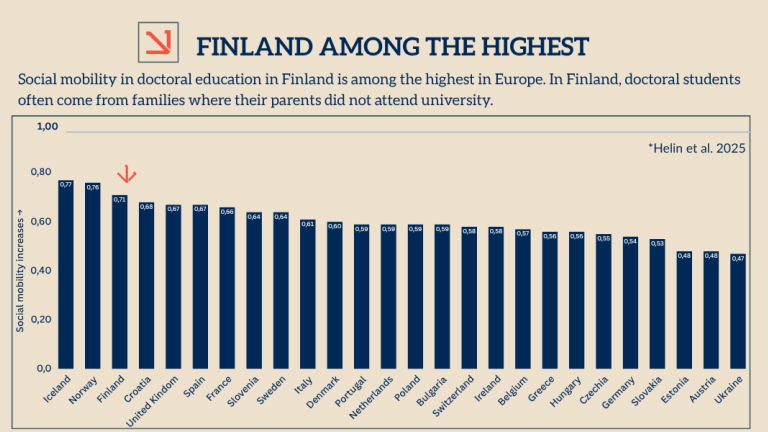Who earns a PhD in Finland? Family background and equality of opportunity

The Finnish education system is considered to be among the most equitable in the world, with educational opportunities available regardless of family background. Until recently, we did not know whether these opportunities also extended to the PhD level.
In a new study, we compared the importance of family background in PhD attainment across 26 European countries and found that Finland exhibits one of the highest levels of social mobility into PhD education.

Doctorates are often obtained by people from families without higher education
Our findings mirror those in previous work, where the egalitarian educational policies of the Nordic welfare states are thought to explain the relatively high levels of educational mobility in Northern Europe. At the PhD level, we find that the Nordic countries are joined in this high mobility club by countries with very different educational traditions, such as the UK and France.
Between other European countries, differences in mobility in doctoral education are also smaller than one would perhaps expect. We found mobility to be generally high in most of the countries studied and, contrary to popular belief, a large share of PhDs both in Finland and elsewhere in Europe come from families where neither parent held a higher education degree.
The relationship between parental background and PhD attainment is also generally weaker than at lower levels of education.
In Finland, for example, we find that family background plays a much smaller role at the PhD level than at the master’s level, or in predicting graduation from general upper secondary school. In an earlier study, we have also shown that family background does not appear to play an important role in careers in Finnish academia, and that many Finnish professors come from modest parental backgrounds.
Diversity in the backgrounds of PhDs ensures choice of role models
When a country has high social mobility into PhD education, it is a sign that parental background does not play a decisive role in determining who obtains a PhD. Just because a country has high mobility into PhD education does not, however, imply that the selection mechanism is necessarily fair or just. A selection based more strongly on gender would, for example, result in a weaker association with parental background, as would random selection.
While we now know that the role of parental background is limited in the selection of students for European PhDs, much less is known about the basis on which these selections are actually made. Somewhat worryingly, for example, is the fact that, in Finland, women earn their doctoral degrees at later ages than men do and have a lower subsequent probability of obtaining a professorship.
The question of how PhD candidates are selected is important not only for potential doctoral students themselves, but also for society as a whole.
Not only can the exclusion of talented PhDs harm the quality of research and teaching, a lack of diversity among PhDs can reduce the breadth of research ideas and leave students with an unnecessarily narrow choice of role models. Our research findings are a cause for optimism in this respect, but not without qualification.
Doctoral researcher Jouni Helin works as a university teacher at the Faculty of Education and Psychology at the University of Jyväskylä, and Kristian Koerselman works as a university researcher at the Finnish Institute for Educational Research at the University of Jyväskylä.








